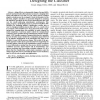Free Online Productivity Tools
i2Speak
i2Symbol
i2OCR
iTex2Img
iWeb2Print
iWeb2Shot
i2Type
iPdf2Split
iPdf2Merge
i2Bopomofo
i2Arabic
i2Style
i2Image
i2PDF
iLatex2Rtf
Sci2ools
122
click to vote
TNN
2008
2008
Just-in-Time Adaptive Classifiers - Part II: Designing the Classifier
Aging effects, environmental changes, thermal drifts, and soft and hard faults affect physical systems by changing their nature and behavior over time. To cope with a process evolution adaptive solutions must be envisaged to track its dynamics; in this direction, adaptive classifiers are generally designed by assuming the stationary hypothesis for the process generating the data with very few results addressing nonstationary environments. This paper proposes a methodology based on -nearest neighbor (NN) classifiers for designing adaptive classification systems able to react to changing conditions just-in-time (JIT), i.e., exactly when it is needed. -NN classifiers have been selected for their computational-free training phase, the possibility to easily estimate the model complexity and keep under control the computational complexity of the classifier through suitable data reduction mechanisms. A JIT classifier requires a temporal detection of a (possible) process deviation (aspect tack...
Related Content
| Added | 15 Dec 2010 |
| Updated | 15 Dec 2010 |
| Type | Journal |
| Year | 2008 |
| Where | TNN |
| Authors | Cesare Alippi, Manuel Roveri |
Comments (0)

